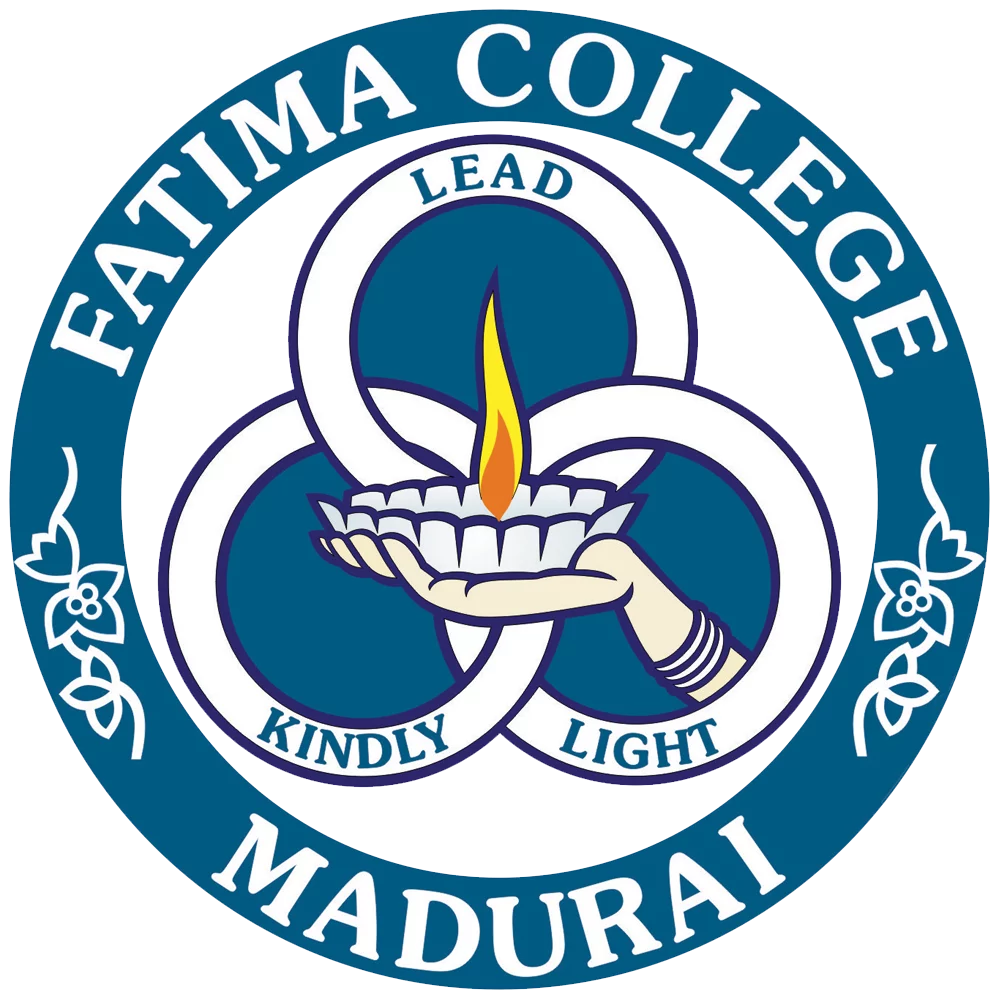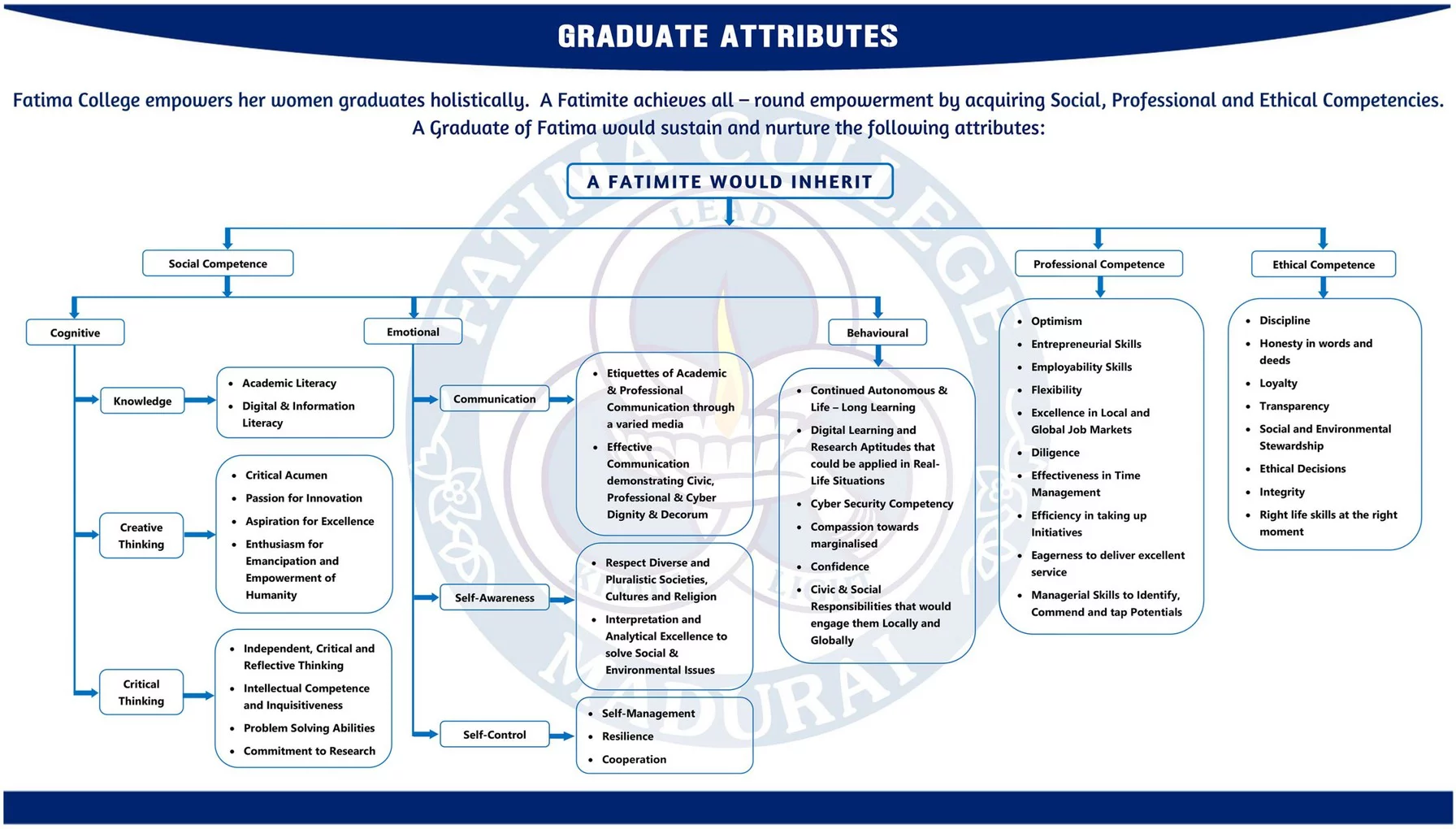Academic
20/04/2023 2025-03-25 11:56Academic
Academic
Studying at Fatima College is a great way to enhance your career

Our college prepares students with the transformative experience who make a positive impact on the world.
Students
Graduation rate of our student
Different Majors
OVERVIEW (CBCS & OBE)
From 1990 Fatima College being autonomous were framing its’ own Curriculum. In 2001 the Choice Based Credit System (CBCS) was introduced. Since then, the college has raised the bar of Higher Education and has catered to the needs of the stakeholders offering a learner-centric curriculum in the digital era. The College moved from content-based to competency-based Curriculum-Outcome Based Education under CBCS in 2019. This learner-centric teaching pedagogy measures the students’ performance through the respective course/programme outcomes after a considerable period of time. The course/programme outcomes are realised based on the knowledge, skills and attitudes acquired by the learner shaping them into inquisitive researchers, topical innovators, befitting employees of the upcoming job markets and above all better citizens of this global village.
The UG curriculum incorporates Major Core, Generic Electives, Discipline Specific Electives, Skill Enhancement Courses, Value-Education, Non-Major Electives, Environmental Studies, Gender Studies and Project besides the Part – I & II Languages. Major Core, Electives, Skill Enhancement Courses, Inter-Departmental Courses, Internship and Project form the PG Curriculum. A wide range of Value-Added and Skill-Embedded Crash/Certificate Courses are offered beyond the UG and PG curriculum. CBCS with its rich and varied palette of courses opens up newer avenues of ICT-based learning beyond the opted discipline across the departments. Through synergistic efforts each department strives to achieve the following:
- In tune with TANSCHE’s curricular structure, UGC guidelines and NAAC expectations regular designing and development of quality-based curriculum with local, regional, national and international relevance leading to excellence, are realised.
- Academic flexibility and academic mobility are provided to the learners through cafeteria/automat approach by enabling them to choose the following:
- Non–Major Electives
- Inter–Departmental Courses
- Add–on Courses
- Extra-Credit Courses
- Skill–Embedded Courses / Ability Enhancement Courses / Value-Added Courses
- Project Team–Mates and Supervisors
- Research Guides and Supervisors
- Part–V
Based on the potentials of an individual learner, hailing from a pluralistic community,
- Blended/Flipped learning is promoted. Learning is made exciting, enjoyable and fun-filled, facilitating application of the knowledge and the skills acquired as well as by promoting vertical and horizontal mobility.
- Holistic education is offered in the multi-cultural/ multi-religious context with a special focus on building a better society through the following Ability Enhancement Compulsory Courses:
- Foundation Courses
- Value Education
- Professional Ethics
- Personality Development
- Environmental Studies
- Gender and Environment
- Family Life Education
- Life Skills
- Human Rights
- Soft Skills
- A conducive research ambience is created and hands-on-trainings are given by mandating projects and internships.
- Contemporary courses with Local, Regional, National, and Global relevance are rolled out in the respective programmes in keeping with the emerging trends and by fulfilling the futuristic demands of the stakeholders.
Fatima College has moved from content-based to competency-based curriculum. Outcome Based Education (OBE) from the academic year 2019 – 2020, which is yet another milestone in Higher Education. This learner-centric teaching pedagogy focuses on measuring the students’ performance through the respective course/programme outcomes after a considerable period of time. The course/programme outcomes are realised based on the knowledge, skills and attitudes acquired by the learner shaping them into inquisitive researchers, topical innovators, befitting employees of the upcoming job markets and above all better citizens of this global village.
 PROGRAMME OUTCOMES (POs)
PROGRAMME OUTCOMES (POs)



 HUMANITIES
HUMANITIES
